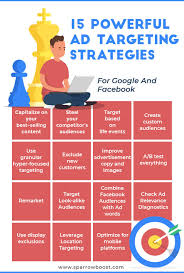Mastering Audience Targeting Strategy: Reaching Your Ideal Customers Effectively
Audience Targeting Strategy: Reaching the Right People for Your Business
Effective audience targeting is a crucial component of any successful marketing campaign. By identifying and reaching out to the right people, businesses can maximise their impact and drive meaningful results. A well-defined audience targeting strategy helps businesses connect with individuals who are most likely to be interested in their products or services.
One key aspect of audience targeting is understanding your target audience’s demographics, interests, behaviours, and preferences. This information allows businesses to create personalised and relevant content that resonates with their audience. By tailoring messages to specific segments of the population, businesses can increase engagement and conversion rates.
Another important element of audience targeting is utilising data and analytics to refine your approach. By analysing customer data, businesses can gain insights into their audience’s buying patterns, online behaviour, and response to marketing campaigns. This data-driven approach enables businesses to make informed decisions about where and how to reach their target audience.
Social media platforms have revolutionised audience targeting by offering advanced tools that allow businesses to narrow down their target audience based on various criteria such as age, location, interests, and online behaviour. By leveraging these tools effectively, businesses can run highly targeted ad campaigns that reach the right people at the right time.
It’s also essential for businesses to continuously monitor and evaluate the performance of their audience targeting strategy. By tracking key metrics such as click-through rates, conversion rates, and engagement levels, businesses can assess the effectiveness of their campaigns and make adjustments as needed to improve results.
In conclusion, a well-crafted audience targeting strategy is vital for any business looking to maximise its marketing efforts and achieve success in today’s competitive landscape. By understanding your target audience, leveraging data-driven insights, utilising social media tools effectively, and monitoring performance metrics, businesses can reach the right people with the right message at the right time.
Effective Audience Targeting: Five Essential Tips for Strategic Engagement
- Research and understand your target audience demographics, interests, and behaviours.
- Create buyer personas to represent different segments of your target audience.
- Use data analytics to track and analyse audience engagement with your content.
- Tailor your messaging and content to resonate with the specific needs and preferences of your target audience.
- Regularly review and adjust your audience targeting strategy based on performance metrics and feedback.
Research and understand your target audience demographics, interests, and behaviours.
To enhance the effectiveness of your audience targeting strategy, it is crucial to conduct thorough research and gain a deep understanding of your target audience’s demographics, interests, and behaviours. By delving into these key aspects, businesses can create tailored marketing campaigns that resonate with their audience on a personal level. Understanding who your audience is, what they are interested in, and how they behave allows you to deliver relevant messages that capture their attention and drive engagement. This research-driven approach not only helps in reaching the right people but also paves the way for building lasting relationships with your target audience.
Create buyer personas to represent different segments of your target audience.
Creating buyer personas is a valuable tip for enhancing your audience targeting strategy. By developing detailed profiles that represent various segments of your target audience, you can gain a deeper understanding of their demographics, preferences, and behaviours. These buyer personas help you tailor your marketing efforts more effectively by crafting personalised messages and content that resonate with each specific group. By aligning your strategies with the needs and characteristics of these personas, you can enhance engagement, drive conversions, and ultimately strengthen your overall marketing impact.
Use data analytics to track and analyse audience engagement with your content.
Utilising data analytics to track and analyse audience engagement with your content is a valuable tip in audience targeting strategy. By monitoring metrics such as click-through rates, time spent on page, social shares, and conversion rates, businesses can gain valuable insights into how their target audience is interacting with their content. This data-driven approach allows businesses to identify trends, preferences, and areas for improvement, enabling them to refine their content strategy to better resonate with their audience and drive more meaningful engagement.
Tailor your messaging and content to resonate with the specific needs and preferences of your target audience.
To enhance the effectiveness of your audience targeting strategy, it is crucial to tailor your messaging and content to align with the specific needs and preferences of your target audience. By understanding what resonates with your audience and addressing their unique requirements, you can create a more personalised and compelling experience that drives engagement and encourages action. Customising your messages to speak directly to the interests and concerns of your audience not only helps you connect on a deeper level but also increases the likelihood of achieving your marketing objectives.
Regularly review and adjust your audience targeting strategy based on performance metrics and feedback.
Regularly reviewing and adjusting your audience targeting strategy based on performance metrics and feedback is essential for ensuring the effectiveness of your marketing efforts. By analysing key metrics such as engagement levels, conversion rates, and customer feedback, businesses can gain valuable insights into the success of their campaigns and make informed decisions on how to refine their targeting approach. This iterative process allows businesses to stay agile, adapt to changing market dynamics, and ultimately reach the right audience with precision and impact.



